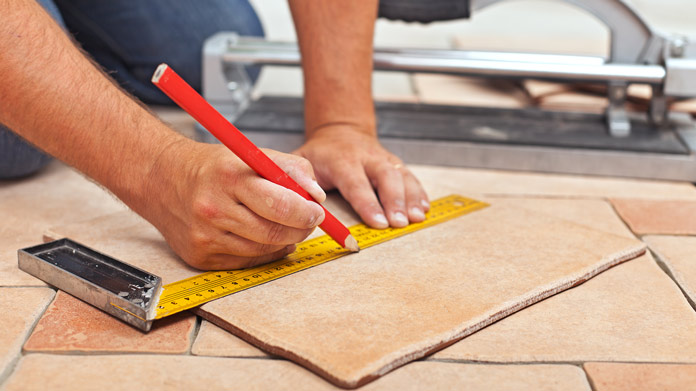If you’re thinking about starting your own flooring installation business, there are a few things you need to know. First, you’ll need to understand the basics of flooring installation. This includes knowing how to measure and cut different types of flooring materials, as well as how to install them properly.
You’ll also need to have a good understanding of the different types of floors available, so that you can offer your clients a variety of options. Finally, it’s important to have a strong marketing plan in place so that you can attract new clients and grow your business.
- Choose the type of flooring you want to install
- There are many options available, including hardwood, laminate, tile, and more
- Research the costs of materials and labor for your chosen type of flooring
- This will help you determine your pricing structure
- Purchase the necessary tools and equipment for installation
- This may include items such as saws, sanders, adhesives, and more
- Advertise your business to potential customers in your area
- This can be done through online listings, flyers, or word-of-mouth marketing
- Once you have secured a job, complete the installation according to the specifications provided by the customer
- Be sure to clean up any messes made during the process
How to Start a Flooring Installation Business | Including Free Flooring Business Plan Template
Is Owning a Flooring Business Profitable?
There are many factors to consider when trying to determine if owning a flooring business is profitable. The first thing you need to take into account is the start up costs. You will need to purchase inventory, hire staff, and set up a marketing budget.
Once you have all of these things in place, you can begin to generate revenue. The next thing you need to consider is your competition. If there are already several established businesses in your area, it may be difficult to break into the market.
However, if you offer something unique or specialize in a certain type of flooring, you may be able to attract customers who are looking for something specific. You also need to think about the ongoing costs of running a business, such as rent, utilities, and employee salaries. If your overhead costs are too high, it may be difficult to make a profit.
However, if you keep your expenses low and focus on generating sales, you should be able to run a successful business. In conclusion, owning a flooring business can be profitable if you carefully consider all of the factors involved. Start-up costs can be significant, but if you have a well-thought-out plan and focus on generating sales, you can make your business thrive.
How Much Can I Make Installing Flooring?
When it comes to installation, the average cost of flooring can range anywhere from $6 to $12 per square foot. This means that your total cost for materials and labor will be between $1,200 and $2,400. Of course, the actual amount you’ll end up spending will depend on a number of factors, including the type of flooring you choose, the size of your project and the complexity of the install.
How Much Should I Charge for Flooring Installation?
There is no definitive answer to this question as the amount you charge for flooring installation will depend on a number of factors, including the type of flooring being installed, the size of the project, your experience and location. With that said, there are some general guidelines you can follow when pricing your services. For example, according to HomeAdvisor’s True Cost Guide, the national average cost to install hardwood floors is $2,831 with most homeowners spending between $1,404 and $4,247.
If you’re installing laminate or vinyl flooring, the average cost is much lower at $1,411 with most homeowners spending between $739 and $2,102. When pricing your services, be sure to factor in the cost of materials as well as your labor. For smaller projects, you may want to charge a flat rate while for larger projects you may want to charge by the square foot.
You should also consider whether or not you’ll need to rent any tools or equipment for the job which could add to your costs. Ultimately, how much you charge for flooring installation will come down to what you think is fair based on your experience and the scope of work involved. By providing quality workmanship at a fair price, you’ll be able to build a strong reputation in your community and attract repeat customers.
Is Being a Flooring Installer Worth It?
There are many different types of flooring installer jobs available, and the pay can vary greatly depending on experience, geographical location, and type of employer. However, in general, being a flooring installer can be a very rewarding career. The most important thing for anyone considering a career as a flooring installer is to make sure that they have the proper training and education.
There are many technical aspects to installing floors, and it is important to be able to understand the materials involved as well as the installation process itself. Many community colleges offer courses in flooring installation, or potential installers can get on-the-job training from an experienced installer. Once someone has the necessary training, there are many opportunities available in the field of flooring installation.
Many Installers work for large companies who specialize in flooring installation, while others may find work with smaller local businesses or even as independent contractors. Pay rates will vary depending on employer and experience level, but in general, Flooring Installers can expect to earn a good wage. In addition to earning a good salary, Flooring Installers also often enjoy other benefits such as paid vacation days and health insurance.
Some employers also offer retirement savings plans or other financial incentives. Overall, being a Flooring Installer can be a very stable and rewarding career choice.
How Profitable is a Flooring Business
If you’re considering starting a flooring business, you might be wondering how profitable it can be. The answer depends on a number of factors, including the type of flooring you install, the quality of your work, and the region where you live. Generally speaking, businesses that install hardwood floors tend to be more profitable than those that install other types of flooring, such as carpet or laminate.
That’s because hardwood floors are more expensive to install and require more skill to do so correctly. As such, customers are often willing to pay more for hardwood floor installation than for other types of flooring. The quality of your work is another important factor in determining profitability.
If you’re known for doing high-quality work, you’ll likely have repeat customers and word-of-mouth referrals working in your favor. On the other hand, if your work is sloppy or inadequate, you may find it difficult to attract new business. Finally, the region where you live can also affect your profitability.
In general, businesses in urban areas tend to be more profitable than those in rural areas simply because there’s more demand for their services. However, this isn’t always the case – it really depends on the local economy and housing market conditions. So how profitable is a flooring business?
It really varies depending on a number of factors.
Conclusion
Assuming you would like a summary of the blog post titled “How to Start a Floor Installation Business”: The blog post covers everything an individual needs to know in order to start their own floor installation business. It begins by discussing the necessary equipment and supplies, which include items such as flooring materials, tools, and insurance.
Next, it outlines the steps for creating a business plan and marketing strategy. Finally, it provides advice on pricing services and handling customer inquiries. Throughout the post, the author includes tips based on their own experiences in the industry.
I have been working as a freelance writer for newspapers and other websites since 2017. Most of the time, I have worked for clients in the USA, UK, Canada, and Australia. My work primarily focuses on the business, finance, and business tools category.


